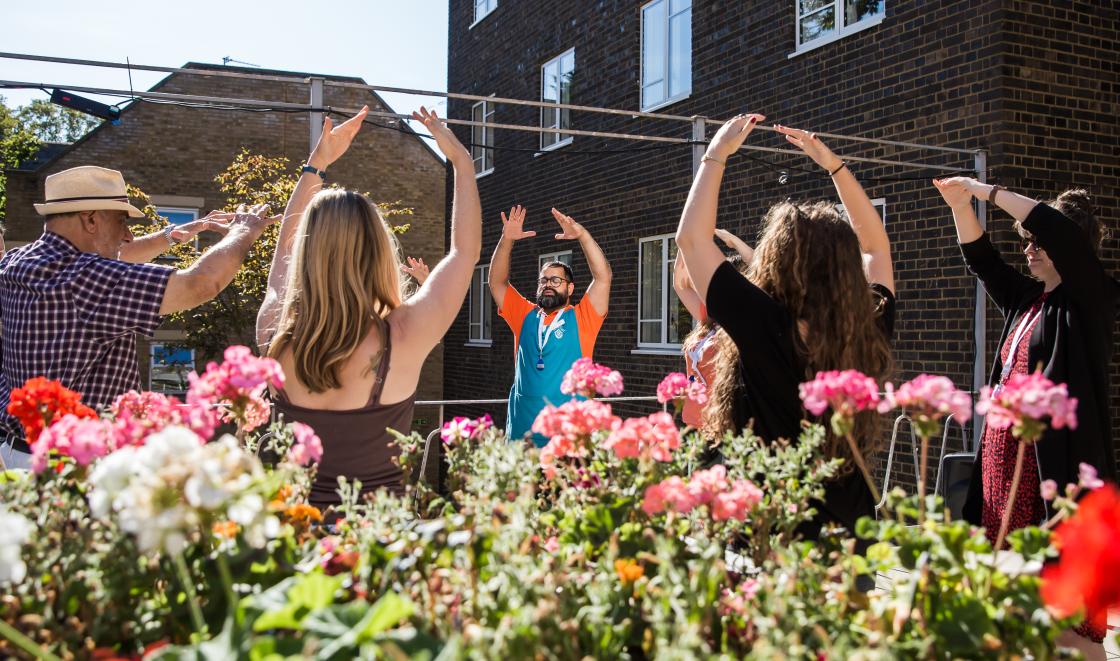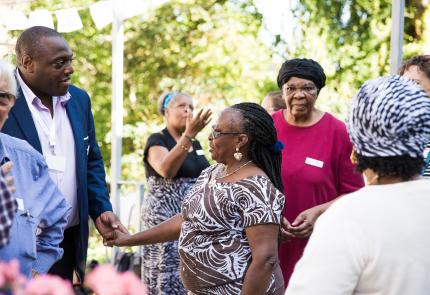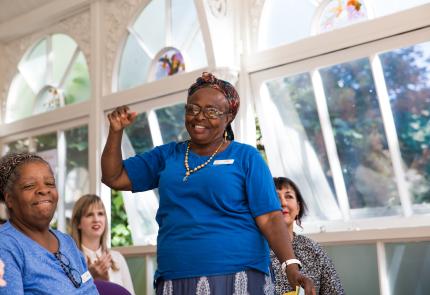Researchers in the social care theme will carry out their own research and also link with other themes to collaborate and identify areas where their research impacts on social care, such as palliative and end of life care and public health research.
Researchers in this theme are based within the NIHR Policy Research Unit in Health and Social Care Workforce. They aim to develop research knowledge in the field of social care to provide the evidence base for social care provision and to disseminate findings to policymakers, service providers, employers and patients, service user and carer groups.
A picture of social care in London
Demand for adult social care is increasing rapidly in London, with the capital’s population growing particularly among groups likely to require social care (London Councils 2019). For example, the highest growth is among people with learning or physical disabilities and psychiatric disorders. Even though London has a generally younger population than the rest of the country, the number of Londoners aged 65 and older is expected to increase by 71% by 2039 – a faster rate than any other region in England. In the same time period, the number of Londoners aged 90 and older is set to grow by 156% [ONS data 2019].
While there is a younger population, there is a higher percentage of younger people with more complex needs and higher costs for the social care sector. London also has a higher proportion of people of working age needing social care provision compared to other parts of the country. For example, the number of working-age Londoners with a learning disability is expected to increase by 7.8% by 2035 and with impaired mobility by 14%.
Those of us who have argued that social care needs to be part of NIHR activity are greatly encouraged by the requirement for ARCs to embrace social care. This change is happening across the whole NIHR and we hope that this will enrich research across systems and promote mutual learning.
Dr Kritika Samsi, social care theme lead
Day services research and responding to local social care priorities
Researchers in this theme will initially focus their work on day services. Day services are valuable places for people with multiple and complex social care and support needs, who want to remain in the community. Such services offer vital care, advice and support to different people, including older people, people with experience of homelessness and people misusing substances. Yet day services are under-researched, so there is little evidence of their value and measure of the impact they may have on peoples’ lives. Practitioners and commissioners make referrals or decisions in the dark and we hope to build a picture of provision with the co-operation of the sector so that they can describe in NHS and local authority language what they do and their impact.
Alongside the day services work, another strand of work involves co-producing research and development priorities for local social care communities and responding to those priorities and working with London councils.
We have created an online Day Centre Resources Hub to help support day centre sustainability, by improving knowledge about them, supporting their operation, and encouraging joint working. The Hub was co-produced with expert stakeholders from older people’s day centres and the wider social care sector after our priority-setting survey identified a need for a body of supportive resources.
Why our research is needed
This research is needed to better understand what day services are provided, how and where they are located in south London. It will address questions around the value of day services for people with multiple long-term and complex conditions and what day services need to operate effectively and efficiently.
Building capacity in social care research
We are part of the Social Care Research Capacity Building Programme, designed to help social care staff to develop the skills and knowledge to use research in the workplace to inform and improve services. Our aim is to build research capacity in adult and children's social care by supporting successful applicants to engage in a range of research activities.
We have co-created community networks which aim to widen involvement in research by under-represented people living in south London, are implementing innovative methods, supporting the workforce to work with people living with dementia and supporting ARC South London social care postdoctoral researchers.

How we are involving patients, services users, carers and public
Study participants will include current users of day services and social care, future users, carers and other people in south London’s diverse communities. We routinely seek their opinion and input to coproduce questions, findings and outputs. We will also use the expertise of our public/patient service user/carer lead – Rekha Elaswarapu.
Day services are an essential community resource for many older people for leading an empowered life. Being able to eat a freshly cooked lunch, enjoy socialising and taking part in activities of interest are integral to maintaining dignity at all times.
It is important that we research and identify robust evidence based on the role of day services to ensure that these resources are well-funded and are effective in improving the quality of life of people who may find themselves in vulnerable situations and at risk of loneliness and related health and well-being issues
Rekha Elaswarapu, patient and public involvement and engagement representative for the Social Care theme
How this work is being taken forward from October 2024 to March 2026
We have expanded our existing programme of work on day care services to include other forms of at-home support (home care, befriending) and out-of-home community voluntary support (day centres, lunch clubs for people from minority ethnic backgrounds, men’s sheds), to determine the contribution of these services in monitoring and maintaining the health and wellbeing of users of adult social care services who live in their own homes.
We are identifying new research priorities by continuing our agile responsive approach, through thriving collaborations and sector-wide engagement with social care practitioners, staff in local authorities, and members of Integrated Care Boards, and responding to these in a timely and rigorous manner. We are also identifying new groups in south London to invite to become involved in research. We are building on the strong relationships we already have, and continuing our involvement in local initiatives, our training and dissemination formats, seminar series and forums, and with local and national stakeholders.
Find out more our work
SC-ImpRes
The SC-ImpRes (Social Care Implementation Research) guide is a new resource created by researchers at ARC South London. It provides a step-by-step approach to designing and conducting implementation research in social care. Implementation research explores, describes, explains and/or predicts implementation. It’s objective is to improve the adoption (take-up) of effective practices, with appropriate adaptation and modification if necessary.
The guide contains eight sections, each of which introduces key terms and concepts relevant to implementation research in social care and includes reflective questions and statements to consider when designing and conducting implementation research.
Find out more
View a overview summary (PDF) of our work from October 2019 to September 2024









